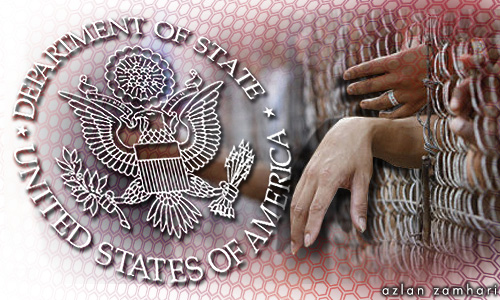The Trafficking in Persons Report, or TIP Report, which is issued annually by the US State Department’s Office, ranks governments based on US perceptions of their efforts to acknowledge and combat human trafficking.
The TIP report gives an indication of the state of human trafficking in the country and the government’s efforts in combating it. The rankings are sometimes controversial, with allegations that political and trade considerations influence the ranking that is accorded to a country.
For example, in 2015 when Malaysia’s ranking went up one notch from Tier 3 (the worst case) to Tier 2 Watchlist, many viewed it as a concession by the US government to enable Malaysia to become party to the Trans Pacific Partnership Agreement (TPPA).
While the rankings may be subjective and susceptible to influence by trade and political considerations, it is worthwhile to study the contents of the report (which are more factual) to obtain an indication of the areas where improvements are needed.
The TIP report 2016 states quite bluntly that “the government did not demonstrate overall increasing anti-trafficking efforts compared to the previous reporting period”. The key areas of concern highlighted in the TIP report are as follows:
Foreign workers in Malaysia and their employers have to pay a substantial amount of money as levies and other administrative fees. The burden of paying these fees is substantially borne by the migrant workers, which makes them susceptible to debt bondage. Additionally, migrant workers usually pay hefty amounts to agents in their countries even before the workers arrive in Malaysia, which further aggrevates their vulnerability to debt bondage.
Many foreign workers are employed by outsourced companies; typically the ultimate employer does not take responsibility for the welfare of the migrant workers thus making them more vulnerable to exploitative labour conditions.
Corruption among immigration and police officers remains a problem and impedes efforts to address trafficking.
Migrant workers, including domestic workers, in many instances are subjected to practices that can indicate forced labor, such as passport retention, contract violations, restricted movement, wage fraud, and imposition of significant debts by recruitment agents or employers.
Domestic workers are not recognised as workers and thus fall outside the scope of protection offered to workers by the Malaysian Employment Act.
Discoveries of mass graves of trafficked persons along the border with Thailand in 2015 generated reports of widespread corruption among police and border control personnel. However no official has been charged or convicted for complicity in trafficking crimes.
The more than 150,000 registered refugees and asylum-seekers in Malaysia lack formal status or the ability to obtain legal work permits, leaving them vulnerable to trafficking or debt bondage.
The government has maintained a dedicated anti-trafficking police force, doubled the number of specialised anti-trafficking labor inspectors, and increased the number of specialised trafficking prosecutors. However the results are hardly impressive. In 2015, the government identified 1,386 potential trafficking victims, of which it confirmed 305 as trafficking victims.
Number of convictions best described as ‘menial’
The government completed 158 investigations (compared to 186 investigations in 2014) of potential trafficking cases and initiated prosecutions against 38 alleged trafficking offenders (compared to 54 prosecutions in 2014) . The number of convictions increased from three to seven, which is best described as ‘menial’.
The government did not convict any employers for unauthorised retention of passports. Thus,the overall picture of the government’s achievement is prosecuting human traffickers is dismal.
Sentences for convicted traffickers were generally not stringent enought to act a deterrent. The average sentence was five years in prison. However, the majority of sentences were weak and incommensurate with those prescribed for other serious offenses.
The anti-trafficking law provides trafficking victims immunity from immigration offenses. However potential trafficking victims who denied they had been subjected to trafficking or whose employers confiscated their documents were sometimes detained, deported, or charged with immigration offenses. In such cases, it would have been more appropriate for the government to proactively conduct investigations for indicators of human trafficking.
Labour inspectorates conducted more than 47,000 labor inspections and issued 6,500 citations for contraventions of the Employment Act. However only seven cases of exploitative labor were referred for criminal proceedings, a paltry figure given the extent of labor trafficking in the country.
All of the above-mentioned findings are not new. Even the US Ambassador to Malaysia, Joseph Yun, setting aside diplomatic niceties is reported as saying that while Malaysia has made progress in passing amendments to the Anti-Trafficking in Persons and Anti-Smuggling of Migrants Act to include better protection for victims, much of these changes have not been enforced.
The TIP report is quite unequivocal that the Malaysian government “did not demonstrate overall increasing anti-trafficking efforts compared to the previous reporting period...” and then adds the non sequitur conclusion “...therefore, Malaysia is placed on Tier 2 Watch List for the second consecutive year”.
It is pointless now to debate whether Malaysia’s ranking on Tier 2 Watch List is justified. What is more important is that the government demonstrates political will and engages with all stakeholders to make significant progress on all the areas of concern that have been identified in the TIP report.
As Ambassador Yun says, “What we want to see is the prosecution numbers increasing, conviction numbers increasing, making sure victims are protected and that civil societies and NGOs working on this issue are free and open to work with,” (At press conference after launch of the ‘Workshop on Reporting on Trafficking in Persons’, Alor Star April 12, 2016.)
JOSEPH M PAUL works with a human rights organisation to create a more humane society.


